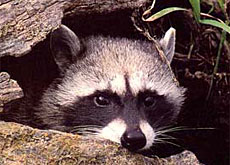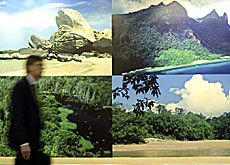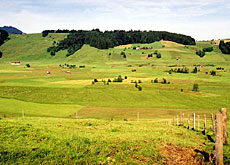Alien life forms threaten Switzerland

Scientists at a meeting in Bern have sounded the alarm over a foreign invasion of Switzerland.
Alien animals and plants pose a serious threat to biodiversity, the national economy and people’s health – according to the organisers of the Neobiota international conference.
Wolfgang Nentwig of Bern University, one of the conference organisers, told swissinfo that the Swiss public needed to be made aware of the inroads foreign species were making.
“People don’t understand that it is bad for nature or human health to transfer alien species from one place to another,” he said. “You shouldn’t buy an exotic flower in a shop and then dump it in the wild.”
Scientists say that what makes these species dangerous is that they have been released from their usual constraints, such as natural predators.
Freed from these shackles, they can display more aggressive behaviour, and even become pests in some areas.
Toxic plants
Examples of alien species making inroads abound. In Switzerland, the arrival of ragweed in grain shipments from North America has been causing discomfort to allergy sufferers.
Globalisation and increased transport are two factors Nentwig blames for the spread of foreign species, including giant hogweed.
“It originated in the Caucasus, and it started really to spread in Europe 30 or 40 years ago,” he said.
“It can cause a rash in people if they touch it, and in conjunction with sunlight it can cause severe skin damage.”
Animal invaders
Animals can also be invaders. Malaria-bearing tropical mosquitoes have been found on rare occasions around Geneva airport, although not in sufficient quantity to form a sustainable population.
A much bigger threat, according to Nentwig, is the recent appearance of two unrelated mammals in central Europe: the North American raccoon and the Asian raccoon-dog.
“In areas where they are already widespread, we have seen a fall in bird populations, which in turn upsets the ecological balance,” he said.
Scientists warn that biodiversity and human health aren’t the only issues associated with alien species. They say there is also an economic cost.
Economic cost
The best-known example is the zebra mussel. Originally found in the Caspian Sea, it has spread to Europe and North America’s waterways thanks to shipping and construction work.
With no real predators, zebra mussels can easily proliferate, clustering in their thousands around water pipes or filters. These installations then have to be cleaned and often repaired at great cost.
Nentwig says that there is no easy solution to dealing with alien invaders, but that Europe should follow the lead of Australia and North America.
“These countries have strict rules on animal and plant imports, but other areas lack such legislation,” he said. “We have to increase checks at our borders and we have to make the population more aware of the risks.”
But researchers face an uphill battle, with few funding opportunities to study and eradicate alien species.
“People don’t seem to realise that while searching for and destroying an invader may be expensive, if a species overruns an entire country, it’s too late to do anything,” added Nentwig.
swissinfo, Scott Capper
Neobiota is the third international conference on biological invasions.
Biologists and ecologists are attending, alongside delegates from environmental and nature conservation agencies.
The conference concentrates on the environmental problems caused by the introduction of alien species to central Europe.

In compliance with the JTI standards
More: SWI swissinfo.ch certified by the Journalism Trust Initiative



You can find an overview of ongoing debates with our journalists here. Please join us!
If you want to start a conversation about a topic raised in this article or want to report factual errors, email us at english@swissinfo.ch.